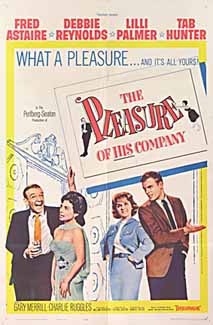
THE PLEASURE OF HIS COMPANY
US, 1961, 115 minutes, Colour.
Debbie Reynolds, Fred Astaire, Lili Palmer, Tab Hunter, Gary Merrill, Charles Ruggles.
Directed by George Seaton.
Based on a popular play, which is often repeated on stage, it is an American drawing room comedy, full of contrived characters and situations. The tone is light, comical. However, some of the themes, especially about marriage and parents are worth consideration. Debbie Reynolds tries her hand at a slightly more serious characterisation. Tab Hunter is her leading man. Fred Astaire, also, in a serious role and Lili Palmer are the main leads. Enjoyable, glossy, frothy in its pleasant treatment of serious themes.
1. The meaning of the title and its irony? The film as enjoyable froth? The significance of the credit sequences?
2. Why do audiences enjoy froth? The response to this kind of light comedy? What were the main comedy ingredients and how wel1 were they used?
3. What is the value of a comedy of manners? As a vehicle of exploring relationships, the morals of society? In a light manner?
4. The film's focus on Jessica, how was she presented? Debbie Reynolds’s personality, as a modern young girl, the relationship with her parents, her searching for a father-figure? the way this was presented, the preparations for the marriage, the background? What discovery did she make in her father? How did this change her? Her holding him up as an ideal? Her enjoying the outings? Being tempted away? The effect of his presence on her marriage preparations? The fights that ensured? her being willing to make a sacrifice to help him in his old age? The final effect of the marriage? What insight into a young girl, a daughter, daydreams, fulfilment?
5. How attractive a character was Pogo? His reputation, the preparation for his arrival, the telegrammes, his preoccupation with himself, his failure in marriages, his success as a playboy, his romantic notions about life and himself, his arriving and taking over, his effect on all? The enjoyment of the outing but the creating of tensions? His taking over of Jessica? His disregard of Roger? His double stands in the fight? His arrogance? The reason for his not wanting Jessica to come? His going? Insight into the selfish playboy character?
6. Catherine and her relationship with Pogo, romantic memories, realism of his failure in the marriage, her happy marriage with Jim, her concern with Jessica, her motherly advice, telling the truth, running risks?
7. Jim – how well delineated in comparison with other characters? Relationship with Catherine and Joanna? Resentment of Pogo?
8. What did Roger stand for? His values, his love, his being humiliated, winning out in the end?
9. What moral and social values did the film stand for? how well were they explored by comedy, wit, situations? The attractiveness of the film in the sixties? Impact now?